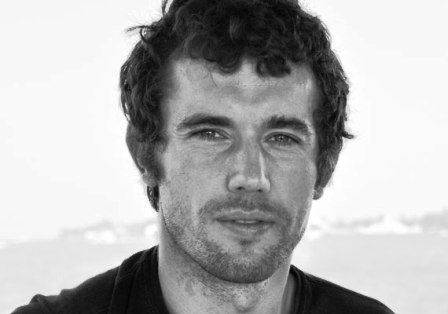


Mantas Kvedaravicius

In 2011 I attended a Summer School in Neringa Lithuania for film students. A film by Mantas Kvedaravicius was shown, his first.
”Stasys Baltakis, teacher at the Lithuanian Academy of Music and Theatre, the film school of the Country, introduced the film and its director. ”He is not a film director, he is a thinker”, he said about the debutant Kvedaravicius, who made the film over a period of years, now completing his PhD (and a book) on the affects of pain. And the film is about pain, about people in Chechnya, families whose members disappear or have undergone torture. Shot illegally, and with one year in the editing, the film expresses pure love and respect for the characters without turning to sentimentalism…
The camera catches magical moments inside the houses, the characters tell their stories of pain and torture, mainly off the picture, car trips give the narrative a flow and information about how a devastated city looks, at the same time as the Russian authorities have done a lot to lighten up mosques and other buildings. Pure facade for the invisible violence, it seems. While watching the film you sense a growing anger and sadness witnessing the life of people, who wait and hope…” (from the review of Barzach, 2011)
”Kvedaravicius, whose last film (his first) ”Barzakh”, a masterpiece, took place in Chechnya, has again created a tense work of a beauty that lies in the aesthetic choices he has made with the camera, that he and two others have operated. You enjoy frame by frame, scene after scene, sequence after sequence the way he has placed the camera and the naturalness with which the editing takes you around.
How shall I leave this praise of a film that develops and towards the end brings images of exploded cars and destroyed buildings, and has scenes where the population is taught how to put out fire… I want to and will remember the shoemaker repairing shoes and having conversations with clients and family. A location that comes back, with peace, a statement of survival of humanism, as this great director has delivered with what is only his second film…” (from the review of Mariupolis, 2016)
And now Mariupolis 2, shot by Kvedaravicius, shown at festivals and awarded as the best European documentary at the EFA ceremony in Reykjavik in December. The film was before that shown at IDFA where it was introduced like this: “In 2022, Mantas Kvedaravičius returned to the ruined city of Mariupol in Ukraine to film the people he met for his 2016 documentary Mariupolis. There, he was killed in early April by Russian troops while documenting the Russian invasion of Ukraine. His fiancée managed to escape with the footage. After his death, producers and crew gave their all to edit his final, unfinished film and show it to the world.”
Watching the film I can only echo what was written about the two previous films. Mantas Kvedaravicius shows his respectful approach to human beings in need, he stays with them, no sensationalism, he follows them when they clean the ground after the Russian bombings, when they gather to eat in the cellar, where they pray and sleep, when they prepare a soup outside, where two men transport a generator at a place, where two corpses lie on the ground, accompanied by the sounds of bombings around all the time, “let’s go to the mass grave” someone says referring to the airstrike in March of the Theatre of Mariupol, where civilians had found shelter.
The great director Mantas Kvedaravicius created with this film what one of the legends in documentary history called “the sense of being there”, with love and respect. RIP.
Photo: Mantas Kvedaravicius (Cineuropa)